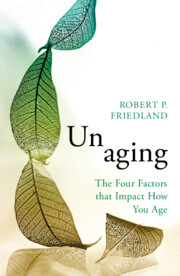Book contents
- Unaging
- Reviews
- Unaging
- Copyright page
- Dedication
- Contents
- List of Figures and Tables
- Preface
- Part I Foundations: What Do We Need to Know about Optimal Aging?
- 1 Aging Is Not Inevitable, It Is an Opportunity
- 2 The Theory of the Multiple Reserve Factors
- 3 The Brain Is Not an Organ, It Is the Master
- 4 Memory and Cognition
- 5 The Neurodegenerative Diseases of Aging
- 6 Stroke and Vascular Cognitive Impairment
- 7 Other Dementias
- 8 Our Microbiota and How to Do Gene Therapy in the Kitchen
- 9 The Health of the Body and the Physical Reserve Factor
- 10 Depression, Anxiety, and What Good Is Feeling Bad?
- 11 Genetics Aren’t Everything
- Part II Applications: What Can We Do about the Opportunity of Aging?
- Part III Conclusions
- Acknowledgments
- Glossary
- References
- Index
10 - Depression, Anxiety, and What Good Is Feeling Bad?
from Part I - Foundations: What Do We Need to Know about Optimal Aging?
Published online by Cambridge University Press: 15 September 2022
- Unaging
- Reviews
- Unaging
- Copyright page
- Dedication
- Contents
- List of Figures and Tables
- Preface
- Part I Foundations: What Do We Need to Know about Optimal Aging?
- 1 Aging Is Not Inevitable, It Is an Opportunity
- 2 The Theory of the Multiple Reserve Factors
- 3 The Brain Is Not an Organ, It Is the Master
- 4 Memory and Cognition
- 5 The Neurodegenerative Diseases of Aging
- 6 Stroke and Vascular Cognitive Impairment
- 7 Other Dementias
- 8 Our Microbiota and How to Do Gene Therapy in the Kitchen
- 9 The Health of the Body and the Physical Reserve Factor
- 10 Depression, Anxiety, and What Good Is Feeling Bad?
- 11 Genetics Aren’t Everything
- Part II Applications: What Can We Do about the Opportunity of Aging?
- Part III Conclusions
- Acknowledgments
- Glossary
- References
- Index
Summary
Depression is common in older people and people who are depressed may have significant memory problems. Recurrent thoughts of sadness may interfere with the registration of new memories. It can develop as a response to life events and appear independently of what is happening. People with a history of serious depression may experience more depression with age. However, people who didn’t experience depression in their younger years may also develop depression. Depression may be a warning sign of mental or physical illness, or a sign of a troubled relationship. Many depressed older persons are aware of their depression, but some are not. Recognizing the presence of depression is key to dealing with it effectively. Signs of depression include sadness and recurring thoughts of regret. Depression is also indicated by loss of appetite, loss of weight, difficulty with sleeping, and loss of interest in activities. There is a vicious cycle in which lack of activity leads to depression, which leads to a lack of activity. Also, social media can also induce negative emotional states. The ability to manage our response to life events is a fundamental part of psychological reserve.
- Type
- Chapter
- Information
- UnagingThe Four Factors that Impact How You Age, pp. 161 - 169Publisher: Cambridge University PressPrint publication year: 2022

